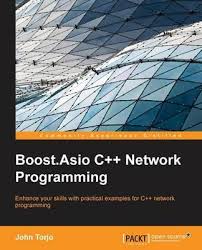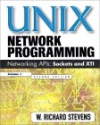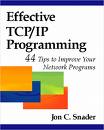Olivier Langlois's blog
Category: TCP/IP
04/02/13
Boost.Asio C++ Network Programming
I have been offered by the publisher to read and review this book. I was enthousiast as network programming is really something I like and I have heard about Boost.Asio usage in some projects without really having taken the opportunity to check out myself what Boost.Asio really was.
The outcome of having read it is that I was left with a lot more unanswered questions than I have received answers. It is a very short book probably of the style 'hands on' 'direct to the point' type of book which I guess has merits so someone can start reading it and hack something very fast. However, in my opinion, this is overdone making the book a bad choice for learning network programming.
My first unanswered question I had when I picked up the book is Why should I use Boost.Asio and what are its benefits over other existing frameworks? Of course, I know the answer that you can find also in the excellent book Network programming in C++ plus the fact that Boost.Asio is fully integrated with STL but the explanation is totally missing from the book.
Explanation between synchronous and asynchronous is very simplistic and can be resume as 'async is more complex than sync but eventually you will prefer async for performance reasons'. It got me a little confused for knowing that the *nix socket API and the Winsock API you can do:
blocking IO
Nonblocking IO or
async IO
which are three different ways of performing IO. I am guessing that what is really done with Boost.Asio is non blocking IO which is close to real async IO and much more common place but nowhere in the book we take the time to really explain what Boost.Asio is really doing.
Code examples are ok I guess so the author can make his point but I spotted a couple less than perfect code which I think is hurting the book credibility. I know this is a harsh judgement but for a book that aims to teach people how to program you have to be examplar as what you teach will be replicated by your readers. I am expecting perfection from a book examples. The type of code that you stare at for some time without being able to figure out how you could improve it. That is the type of quality that you'll get from a book written by Stroustrup or Stevens.
Here are two examples of what I mean:
if ( std::find(c.buff, c.buff + c.already_read, '\n') < c.buff + c.already_read) {
int pos = std::find(c.buff, c.buff + c.already_read, '\n') - c.buff;
1. It is inefficient to call twice std::find(). Imagine that '\n' is the last character in a 2GB array!
2. comparing iterators with the operator '<' works because in this case the container happens to be a POD array but IMO this is bad style to use STL algorithm in a way that will not works on all containers (ie std::list) when using the more common operator != would achieve the same result.
synchronous server code:
void handle_clients() {
while(true)
for (int i = 0; i < clients.size(); ++i)
if ( clients[i].sock.available() ) on_read(clients[i]);
}
This works but polling sockets like crazy and sucking 100% of the processor is not the way to write a server that use synchronous mode. I understand that the book did not aim to be a network programming bible like a Stevens but I would have liked some network theory background. Things such as the different possible server topologies and their benefits drawbacks of each. A very small TCP primer. How TCP connections are established from a client? from a server? I know all that but I tried to have some empathy for the young reader who haven't been exposed to this basic knowledge and since these basics are totally absent from the book, it will be even harder for him to make sense out of the book. This is the first edition so hopefully it will eventually improved.
To conclude, the book has some problems but if you can get a cheap copy it might serve as a very fast introduction to Boost.Asio and get you exposed to the API.
07/06/08
UNIX Network Programming: Networking APIs: Sockets and XTI; Volume 1, Second edition
This is considered by many as the TCP/IP application programming bible and I am among them. This book is simply the most complete and detailed book on Socket programming. It describes every option under all their small details. This makes the book reading lengthy and tedious but it also makes it an excellent reference. Even experienced socket programmers will most likely learn something from this book. For myself, I got a better understanding of the listen() parameter purpose, a better understanding of socket lingering behavior and I refer the book from time to time to refresh my memory on topics such as how to time out a TCP connection attempt.
After having borrowed the second edition from someone at my work, I have decided to get myself a copy of the book. I have purchased the third edition. As of the time of writing this review the price for a used copy of the second edition is 6$ compared to 60$ for the third edition. Since I had the chance to compare the content of both editions, you might be interested to know that beside 1 bug fix in the sample code that I have noticed, the content of both edition is identical to 90% in my estimation. The changes are very minor. Some unimportant topics from the second edition such as XTI have been replaced by very specialized new topics. This means that, in my opinion, purchasing the older second edition which is still very accurate is a very good purchase.
03/11/08
C++ Network Programming Volume 1
ACE is an amazing C++ application framework to create portable networked applications. I wish that I could praise as much the first volume describing this framework but it has some weaknesses in my opinion. It enumerates one by one the different low-level ACE classes that encapsulates, by using the wrapper facade pattern, the differences in services provided by the supported platforms. These services include sockets, threading, process management and synchronization primitives. One strong point of the book is that it demonstrates how using C++ features (like strong typing and RAII idiom) with ACE classes can make programs safer and less prone to bugs. The book also briefly discusses how to design networked services based on the service requirement. My complain about the book is that it covers many topics but since it does not focus on any of them, unless you are totally new with C++ or TCP/IP applications, it is likely that you will not learn much. You will find the book interesting if:
- You have not yet seen the benefits of abstracting the implementation from the users with OO encapsulation
- You have little experience in programming TCP/IP applications
My expectation for this book was that I would learn details about the inner working of the ACE classes. The type knowledge that should have complemented the official documentation provided with the framework. I have found out that it is not really the case. Except for less experienced developers, I think that someone should be able to become able to use all the covered classes in the book with only the documentation coming with the framework. There are few places in the book where I would have like to get this extra information such as in the section on ACE_InputCDR and ACE_OutputCDR or by making sure it is clear for the readers why calling ACE_Handle_Set::sync() is needed after having called select().
I have started to read the second volume and I believe that the second one will fit better my likings as it covers high level patterns built on top of the low-level classes presented in the first volume.
08/13/07
Effective TCP/IP Programming: 44 Tips to Improve Your Network Programs
Not all of the 44 tips are exceptional. Some of them are pretty trivial such as "Read Stevens books" or "consult RFCs" but about 35 tips are very good. The author knows well this topic and explains very well the reasons behind these tips. I am sure that all these good tips can be found in the TCP/IP Illustrated books but if you do not have the time to read 3 volumes consisting of about 2000 pages, this less than 300 pages book will provide a nice synthesis of TCP/IP programming good practices.
06/18/07

Categories: Windows programming, Windows programming, TCP/IP, TCP/IP
Winsock 2.0
Windows sockets are not like BSD sockets. The book explains very well the different specific modes into which winsock can be used: Blocking mode in a dedicated thread, asynchronous mode using Windows messages and Overlapped I/O that removes some memory copying when passing buffer to send/receive data from/to sockets. It also covers the Socket classes provided with MFC. In my opinion, this book covers very well the details specific to Windows version of the socket API and that will allow the readers to take advantage of this socket API version.
:: Next Page >>
Olivier Langlois's blog
I want you to find in this blog informations about C++ programming that I had a hard time to find in the first place on the web.
| Next >
| Sun | Mon | Tue | Wed | Thu | Fri | Sat |
|---|---|---|---|---|---|---|
| << < | > >> | |||||
| 1 | 2 | 3 | 4 | 5 | ||
| 6 | 7 | 8 | 9 | 10 | 11 | 12 |
| 13 | 14 | 15 | 16 | 17 | 18 | 19 |
| 20 | 21 | 22 | 23 | 24 | 25 | 26 |
| 27 | 28 | 29 | 30 | 31 | ||
Search

Categories
Olivier Langlois's blog
- AAC (2)
- Book reviews (12)
- C++ (24)
- Code Optimization (4)
- Compiler (3)
- Fractal (2)
- Linux/UNIX (3)
- Multithreading (3)
- Software security (7)
- TCP/IP (8)
- Web (1)
- Windows programming (19)
- C++ (28)
- tutorials (4)
- General (10)
- Hardware reviews (2)
- Linux (12)
- Recommended books (4)
- C++ (20)
- Code Optimization (2)
- Compiler (3)
- Fractal (2)
- Linux/UNIX (1)
- Multithreading (2)
- Rare out of print (3)
- Software security (5)
- TCP/IP (7)
- Windows programming (16)
- Software reviews (0)
- TCP/IP (8)
- Video games (4)
Archives
- January 2016 (1)
- September 2015 (1)
- July 2015 (1)
- June 2015 (1)
- May 2015 (1)
- December 2013 (3)
- September 2013 (1)
- May 2013 (8)
- April 2013 (1)
- December 2010 (1)
- August 2010 (1)
- June 2010 (1)
- More...
Misc
 XML Feeds
XML Feeds
What is RSS?
Who's Online?
- Guest Users: 9
 BOOKS i'm reading
BOOKS i'm reading







